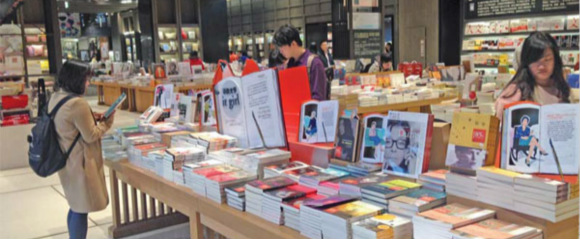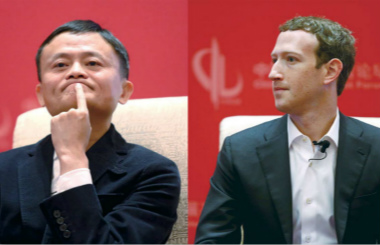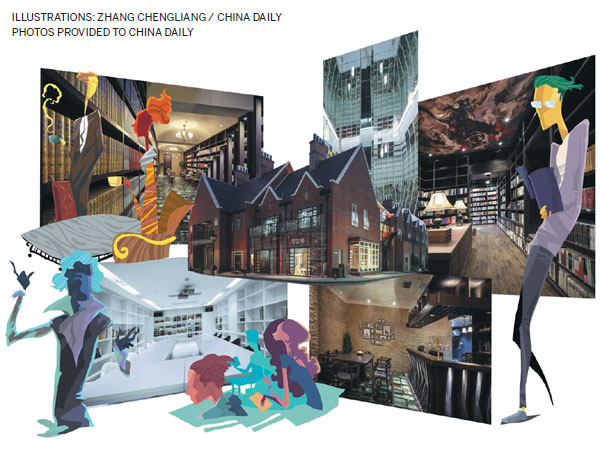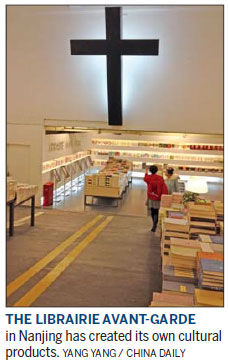Bookshops reinvent themselves
Updated: 2016-04-01 08:28
By Yang Yang(China Daily Europe)
|
|||||||||
"These days, who reads books?" I've just made myself comfortable at a table in a cafe in People's Square, Shanghai, on a warm Saturday evening when Hua Chun, 27, started griping about how superficial the world is.
Earlier she had taken a stroll along Huaihai Middle Road with a girlfriend. But no sooner had they entered the huge Muji bookstore, said to be the largest in the Chinese mainland, they were hightailing it out of there.
"It was too crowded, and I didn't see many books in there, just a few scattered among clothing and other products, so we headed back to the Shanghai-Hong Kong Sanlian Bookstore," Hua says.
When they arrived at that shop four minutes later it was almost deserted.
"What a contrast," Hua says. "These days, most young people seek pleasure in food, drinks and other entertainment rather than reading books".
Hua is a serious reader, a lover of classic English fiction and of bookstores. That day she bought two books from Sanlian: The Women in White by Wilkie Collins and Selected Short Stories by Nathaniel Hawthorne.
Tracy Zheng, 32, of Nanjing, buys all her books online. She is studying for a doctorate in English language and literature at Nanjing University. When we meet at Librairie Avant-Garde, a 15-minute walk from the campus, she says that in the month since Spring Festival she has talked to no more than five people in the flesh and has not been into a bookshop for about seven years.
"I don't have time. Honestly, the Internet is so convenient and you can get any book online. Why bother to go to an offline bookstore on a day like this?"
It was a freezing day in early March and raining, perfect for staying indoors and finding warmth in a cup of hot tea.
If all the physical bookstores closed, it would probably come as no shock to most. In fact, since 2010, offline bookstores in China have gone through extremely tough times, with a great many closing due to the impact of e-commerce, rising costs and plummeting patronage.
The nadir came when sales in physical bookshops around China fell two years in a row, 2012 and 2013, says the industry monitor, Open Book.
However, in line with the Taoist saying that once a limit is reached a change in the opposite direction is inevitable, in the past two years there has been a revival in private bookstores. Even as the government has urged people to read more, these shops have changed the way they operate to meet the expectations of buyers and are beginning to prosper once again.
Last year, nearly 10 bookstores, big and small, opened in Shanghai, including chain stores such as Sisyphus, Yanjiyou and Muji Books, and smaller stores such as Mephisto and Rhino Library.
In other cities, large chains are shooting up like mushrooms after rain. Taiwan bookstore Eslite opened its first outlet in the mainland in Suzhou, Jiangsu province, at the end of November. It will open another in Shanghai this year.
Librairie Avant-Garde, based in Nanjing, has opened 11 stores since 1996. Last year, it opened a philanthropic library in a place of residence for the She ethnic group in Tonglu county, Zhejiang province. It will open another two bookstores this year.
Zhongshuge, a bookstore brand in Shanghai, opened its first shop in Songjiang district in 2013. By the end of this year it will have three stores in the eastern city. A branch in Chengdu, Sichuan province, is also on the drawing board.
Tao Shuting, 27, has worked for Zhongshuge in Songjiang for three years and is now general manager. She loves Chinese literature and is convinced that physical bookstores will not die.
"Just as a person needs to read good books for his or her soul, a city needs good bookstores for its soul," she says. Although Zhongshuge has reported losing money, "we're very likely to make a profit in 2016", she says.
Colin Lang, of Taiwan, has been busy since Eslite opened in Suzhou. The store started in Taiwan 27 years ago and has run at a loss for the past 15 years, according to media reports. In the three months since its Suzhou shop, Lang, who is operations director, says business has been good.
For him, the closure of offline bookstores provides a good opportunity to reflect on the reasons.
"While a lot fail, many others still exist and are even expanding, which means people still need bookstores," he says, as he sits in the store's Blackpages Cafe sipping coffee. "The question is whether the old ways can meet consumers' expectations today."
At Librairie Avant-Garde, I order a latte as I wait for Zhang Xing, the operations director. He has worked there for 10 years.
"The time for traditional bookstores has gone forever," he says. "They sell books only, but the new fashion is to diversify. Bookstores are going through a transformation, and each newly opened bookstore has its own characteristics."
He agrees with Lang in that "in a new era, readers have new expectations".
"Readers now pay more attention to what happens in the space because they come here not only to buy books, but also to communicate with friends, for exhibitions, to attend a lecture or learn a skill, which means bookstores will become comprehensive cultural spaces. Eventually all bookstores will be like this, otherwise they're not going to survive."
These days, many bookstores have space set aside for lectures and discussions. Periodically, they host exhibitions and talks by writers.
In Taiwan, Eslite hosts more than 5,000 activities a year, including dance performances. In Suzhou, its outlet offers more than 300 activities a year.
Anyone who hopes to deal solely in books is likely to be forced out of business by e-commerce, or other modes of doing business, Lang says. "But if bookstore space is closely connected with consumers' lifestyles or hobbies, it'll be rather difficult to replace."
I missed out on a treat that took place in Suzhou the day before I arrived, a talk by the Taiwan writer Pai Hsien-yung, but it was a delight to see the works of all my favorite female writers on display for International Women's Day - Virginia Woolf, Susan Sontag, Eileen Chang, Hannah Arendt, Emily Dickinson and Yang Jiang.
While trying to get an idea of the range of books available at Librairie Avant-Garde I came across a great many acquaintances, at least a couple of which I had recently finished reading: Charlotte by David Foenkinos and Love in the Time of Cholera by Gabriel Garcia Marquez.
At Zhongshuge I found myself surrounded by a sea of books - beneath the glass floor, above the glass ceiling, below the stairs, and on the walls.
The bookstore managers interviewed for this story emphasized that they are first and foremost there to sell books, although Eslite in Suzhou rents out 41,000 square meters of its total 56,000 square meters to clothiers, caterers, and dealers in culturally creative products, and strategically arranges products among books.
For example, near books on travel you can buy suitcases, aircraft models and globes as well as book flights.
Today's Top News
Once-endangered pony makes comeback
Bookshop worms way into community
A fresh start
Bookshops reinvent themselves
Xi-Obama bilateral talk to advance ties
Foreign companies reassured on new Internet rules
Beijing and Prague form new key link
Trump drops pledge to back Republican nominee
Hot Topics
Lunar probe , China growth forecasts, Emission rules get tougher, China seen through 'colored lens', International board,
Editor's Picks

|

|

|

|

|

|








